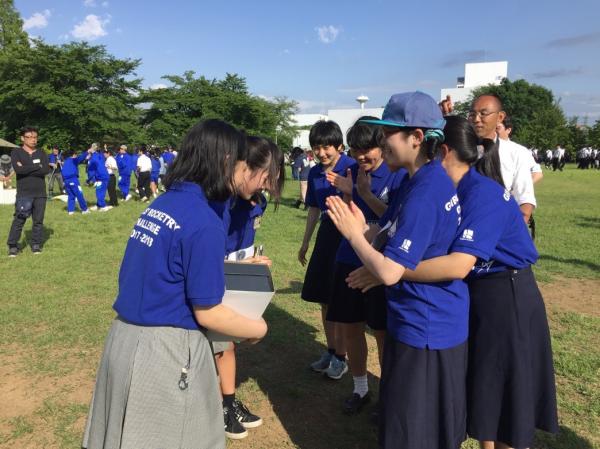Releases
TOKYO, Japan June 11, 2018 – Three school teams from the second cycle of the Girls’ Rocketry Challenge (GRC), Lockheed Martin’s Science, Technology, Engineering and Mathematics (STEM) education program in Japan, have successfully competed in the 32nd National Model Rocketry Competition, taking home three awards. The competition, held at JAXA, Tsukuba on May 19, marks the final milestone of the program.
The team from Iwase Nihon University High School topped the parachute category of the competition, and was also named the best female team of the competition, winning the Lockheed Martin trophy award. They also ranked among the top three school teams of the competition. The competition is attended by school teams from around the country and is held twice a year.
One of the girls from the team commented: "Through this program I experienced the intricacy of making things and the sense of achievement that comes from creating something as a team. I believe that the key to our success was to take our teachers’ advice, discuss in the team, and slowly but steadily approach the ideal frame for the rocket." A team member added: "Making things is a tough process, but when you succeed in enhancing the rocket, and it flies just like you hoped for, it’s a great feeling."
Launched in October 2016, the Girls Rocketry Challenge (GRC) is part of Lockheed Martin’s STEM program in Japan which includes support for the biannual National Model Rocketry Competitions, and Rocket Koshien. The GRC initiative aims to encourage female students to explore their curiosity in the STEM field, utilising model rocketry for a hands-on approach to scientific experimentation and practical application of theoretical knowledge outside of the classroom. GRC has expanded its reach from the Kanto region of Japan in the first cycle, to now include schools nationwide. The third cycle was launched in May, and will include schools from Okayama Prefecture, Miyagi Prefecture, and Chiba Prefecture.
The program is run in partnership with the Japan Association of Rocketry, a non-profit organization that sets the industry standard for model rocketry in Japan with the support of Leave a Nest, a science education company that also runs workshops on model rocketry. This year, the program also welcomes Chiba Institute of Technology as a supporter, enabling GRC participants to receive further guidance in their learning journey in rocket science.
“We are thrilled that the Girls Rocketry Challenge begins its third year with great momentum. Alongside the success of Iwase Nihon University High School, the program has received an additional boost with the participation of Chiba Institute of Technology. Lockheed Martin sees education as a crucial investment for both business and society, and we look forward to continue working closely with our partners to enhance the collaboration between industry and educators to advance STEM education in Japan,” said Chuck Jones, Lockheed Martin Japan’s chief executive.
“The support by Lockheed Martin, in form of the Girls’ Rocketry Challenge as well as the awards at the competition, has positively impacted school education in Japan. For example, it has doubled the number of junior and senior high school girls applying to our national competitions,” said Makoto Yamada, chairman of JAR. “The Association has also received requests for private tutoring, from schools that could not join the Girls’ Rocketry Challenge this year. We wish to continue this program for a long time to maximise its wonderful effects.”
Prof. Yutaka Wada from the Chiba Institute of Technology commented: “We are extremely pleased to contribute to this program, which provides excellent educational opportunities to students and conforms to our Institute’s motto ‘To contribute to world culture through technology’. The hands-on learning at our university and the STEM program complement each other perfectly and will contribute to developing future Japanese talent.”


